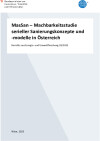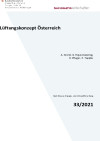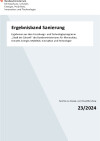Suchergebnisse
GreenTech-Renovation - Energetische Sanierung von gläsernen Gebäuden von architektonischem Wert
Der Schwerpunkt des Projekts GreenTech-Renovation war, innovative Lösungen zur energetischen Sanierung von architektonisch wertvollen Bauten mit hohen Glasanteil zu finden. Dafür wurde ein zukunftsweisendes bauphysikalisches Konzept entwickelt, das den Einsatz alternativer Energieformen beinhaltet. Ein intelligentes Nutzungskonzept kann mit ökologischem und sozialem Engagement die energetischen Sanierungskonzepte verstärken und deren Nachhaltigkeit garantieren. Die 10-R der Kreislaufwirtschaft (Refuse, Rethink, Reduce, Reuse, Repair, Refurbish, Remanufacture, Repurpose, Recycle, Recover) dienen dabei als Leitlinie.
GreenTech-Renovation - Energetic Renovation of Glass Buildings of Architectural Value
The focus of the GreenTech-Renovation project was to find innovative solutions for the energetic renovation of architecturally valuable buildings with a high proportion of glass. A future-oriented building physics concept that includes the use of alternative forms of energy had been developed for this purpose. With ecological and social commitment, an intelligent usage concept could strengthen the energetic renovation concepts and guarantee their sustainability. The 10-Rs of the circular economy (Refuse, Rethink, Reduce, Reuse, Repair, Refurbish, Remanufacture, Repurpose, Recycle, Recover) will serve as a guideline.
EnerPHit-Grünkonzept - Modernisierung eines Gründerzeitgebäudes mit Anwendung eines Aerogel-Dämmputzes
In diesem Demonstrationsvorhaben wurde eine umfassende Modernisierung im gründerzeitlichen Gebäudebestand beispielgebend für die Randbedingungen einer regionalen Schutzzone umgesetzt. Durch die Anwendung des Aerogel- Hochleistungsdämmputzes wurde eine gründerzeitliche Fassadendämmung im Rahmen einer hocheffizienten, umfassenden Sanierung bei gleichzeitiger Erhaltung des Fassadenbildes umgesetzt.
RENOWAVE.AT - The innovation lab for sustainable, climate-neutral renovation of buildings and districts
RENOWAVE.AT will act as a central contact point for collaboration in innovation projects and provide systematic and early access to as well as promote innovative, scalable renovation concepts and sustainable renovation technologies within real development environments (open innovation principle).
MasSan - Machbarkeitsstudie serieller Sanierungskonzepte & -modelle in Österreich

Machbarkeitsstudie zur Darstellung und Analyse der Rahmenbedingungen und Potentiale von seriellen Sanierungen großvolumiger Bauten. Dabei werden die Erkenntnisse aus nationalen Pilot-Projekten sowie von internationalen Projekten und Erfolgsmodellen extrahiert und auf ihre Umsetzbarkeit im österreichischen Kontext geprüft, bzw. die benötigten Erfordernisse für eine schnelle Verbreitung aufbereitet.
Schriftenreihe
29/2025
H. Grief, C. Ninaus, AEE Intec M. Ploss, T. Roßkopf-Nachbaur, W. Amann, A. Mundt, S. Formanek, S. Fuchs, I. Mühlbauer, Ulla Unzeitig, C. Weiser
Herausgeber: BMIMI
Deutsch, 113 Seiten
Downloads zur Publikation
DALEC - Day- and Artificial Light with Energy Calculation
Entwicklung eines Online-Konzeptanalysetool für ArchitektInnen, BauingenieurInnen, LichtplanerInnen und Bauherrn, welches trotz einer einfachen Handhabung und kurzen Berechnungszeiten, die komplexen lichttechnischen und thermischen Vorgänge in einem Gebäude abbildet und Heiz-, Kühl- und Kunstlichtbedarf anschaulich bewertet. Zudem wurde das Nutzerverhalten (z.B. Blendschutz) berücksichtigt und visuelle und thermische Komfortkriterien analysiert. Diese neuartige und innovative, gesamtheitliche Betrachtung ermöglicht eine nachhaltige und energieeffiziente Entwurfsplanung für Neubau und Sanierung.
THERM-opti-BALKON: Thermisch optimierte Balkonsanierung
Bei der thermischen Sanierung von Gebäuden stellen frei auskragende Balkone ein besonderes Problem dar. Das Projekt hatte zum Ziel, die Grundlagen für die Entwicklung eines praxistauglichen und kostengünstigen Befestigungssystems zu schaffen, das die thermisch entkoppelte Wiedererrichtung der Balkone im Zuge der Sanierung erlaubt und damit die Effizienz der Wärmedämmmaßnahme deutlich verbessert.
Lüftungskonzept Österreich

Ziel des Projektes ist die Schaffung eines Nachweisverfahrens (auf Basis Microsoft-Excel), welches zeigt, ob eine natürliche Lüftung bzw. Fensterlüftung bei einer Standardnutzung zur Vermeidung von Schimmelbildung ausreichend, bzw. in Hinblick auf eine ausreichende hygienische Luftqualität zumutbar ist.
Schriftenreihe
33/2021
A. Greml, G. Rojas-Kopeinig, R. Pfluger, P. Tappler
Herausgeber: BMK
Deutsch, 87 Seiten
Downloads zur Publikation
REGOreal - 100% Erneuerbare Energie Region: Lokale Energie Gemeinwohl Oekonomie im Reallabor für vernetzte Energie- und Mobilitätszellen
In REGOreal geschieht die Sondierung für eine 100% Erneuerbare Energieregion im Raum Retz-Horn-Krems-Tulln (NÖ) sowie Mallnitz (Ktn). Es gibt vier Fokusthemen: 100 Erneuerbare Energie-Gemeinschaften (EEG), 1.000 Gebäudesanierungen, 10.000 Energie-Exporteure und -Exporteurinnen (im Sinne der Mitarbeiter:innen, welche den Ansatz ins private Umfeld tragen) und 100.000.000 km nachhaltiger Mobilität mit umfassender Nutzung von IT für die Entwicklung lokaler integrierter Energyiesysteme (IES) zur Einbindung eines bunten Mix unterschiedlicher Akteure und Akteurinnen und Objekte.
LehB:klimafit! Live in existing buildings today: climate fit together
The aim of the project is to explore transferable renovation concepts for the implementation of climate-fit renovations in Vienna. Integrally optimized renovation packages will be developed, which will be optimized in the building ensembles for implementation-probable, climate-friendly overall solutions with the relevant stakeholders.
Ergebnisband "Sanierung"

Der vorliegende Ergebnisband stellt abgeschlossene Projekte aus dem Forschungs- und Technologieprogramm „Stadt der Zukunft“ des Bundesministeriums für Klimaschutz, Umwelt, Energie, Mobilität, Innovation und Technologie (BMK) im Bereich innovativer Gebäudetechnologien vor. Die gewonnenen Erkenntnisse sollen eine Entwicklung in Richtung energieeffiziente und klimaverträgliche Stadt unterstützen, die auch dazu beiträgt, die Lebensqualität und die wirtschaftliche Standortattraktivität zu erhöhen.
Schriftenreihe
23/2024
Bianca Pfefferer
Herausgeber: BMK
Deutsch, 28 Seiten
Downloads zur Publikation
PhaseOut - Wärmepumpentechnologien in der Bestandssanierung
Ziel ist die Konzeption, Optimierung, Umsetzung, Demonstration und Bewertung von innovativen, minimalinvasiven Sanierungslösungen (thermische Sanierung und Heizungstausch) mit Wärmepumpen und PV im Geschoßwohnbau an sieben baugleichen Gebäuden. Es erfolgt ein umfänglicher Vergleich verschiedener technischer Lösungsvarianten auf Basis modularer und skalierbarer Gebäudetechniksysteme sowie multifunktionaler Gebäudekomponenten für den Austausch von dezentralen Gasetagenheizungen durch zentrale, semi-zentrale und dezentrale Wärmepumpen-Lösungen.
THERM-opti-BALKON-P2 - Thermisch optimierte Balkonsanierung Phase 2: In-Situ-Versuchsanlage
Bei der thermischen Sanierung von Gebäuden stellen frei auskragende Balkone ein besonderes Problem dar. Mit dem THERM-opti-BALKON-System wird derzeit unter Laborbedingungen ein diesbezüglicher Lösungsansatz erforscht. Phase 2 soll eine In-Situ-Versuchsanlage unter realen Bedingungen als Technologiedemonstrator schaffen. Wichtigster Untersuchungsgegenstand ist das Langzeitverhalten des THERM-opti-BALKON-Systems.
SüdSan - Socially acceptable, climate-compatible refurbishment of two multi-family-houses as a model for the refurbishment of the Südtiroler-Siedlung Bludenz
Planning, energetic-economic optimisation, construction and monitoring of the costs, comfort and energetic performance of two socially acceptable and climate-target-compatible refurbished smaller apartment buildings in the Südtiroler-Siedlung Bludenz.
SüdSan - Sozialverträgliche, klimazielkompatible Sanierung von zwei Mehrfamilienhäusern als Muster für die Sanierung der Südtiroler-Siedlung Bludenz
Planung, energetisch‐wirtschaftliche Optimierung, Bau, und Monitoring der Kosten, Behaglichkeit und der energetischen Performance von zwei sozialverträglich und Klimaziel-kompatibel sanierten kleineren Mehrfamilienhäusern in der Südtiroler‐Siedlung Bludenz.
PhaseOut – Heat pump technologies in the renovation of existing buildings
The aim is the conception, optimization, implementation, demonstration and evaluation of innovative, minimally invasive renovation solutions (thermal renovation and heating system replacement) with heat pumps and PV in multi-storey buildings on seven identical buildings. The comprehensive comparison includes various technical solution variants based on modular and scalable building technology systems as well as multifunctional building components for the exchange of decentralized gas heating by central, semi-central and decentralized heat pump solutions.
Sani60ies - Demonstration minimal invasiver thermischer und energetischer Sanierung klassischer Wohnhausanlagen der 1950er und 1960er Jahre
Systementwicklung einer fassadenintegrierten Bauteilaktivierung für „warme“ Sanierungen mit hohem Übertragungspotenzial auf Gebäude klassischer Wohnhausanlagen der 1950er und 1960er Jahre. Das System wird anhand dreier Bauvorhaben erprobt, weiterentwickelt und durch eine breite Anwendung (über 200 Wohnungen) demonstriert.
Sani60ies - Demonstration of minimally invasive thermal and energetic refurbishment of classic 1950s and 1960s apartment buildings
System development of a façade-integrated building component activation for "warm" refurbishments with high transfer potential to buildings of classic apartment complexes from the 1950s and 1960s. The system is being tested and further developed based on three building projects and demonstrated through broad application (over 200 flats).
SaLüH! Sanierung von Mehrfamilienhäusern mit kleinen Wohnungen - Kostengünstige technische Lösungsansätze für Lüftung, Heizung und Warmwasser
Innovative Lüftungs- und Heizungs-Konzepte für die Sanierung von Mehrfamilienhäusern mit kleinen Wohnungen werden untersucht und platzsparende Heizungs- und Trinkwarmwasser-Kleinstwärmepumpen mit Außen- bzw. Fortluft als Wärmequelle werden für diesen Zweck entwickelt, welche optional in die bestehende Brüstung bzw. eine vorgehängte Holzleichtbau-Fassade integriert werden können.
WEG zur Zukunft - Der WEG zur Umsetzung einer klimafitten Zukunft im Wohnungseigentum
Das Forschungsprojekt "WEG zur Zukunft" untersucht die niedrigen Sanierungsraten von Wohnungseigentümergemeinschaften (WEGs) in Österreich und die damit verbundenen kommunikativen, regulatorischen, organisatorischen und finanziellen Herausforderungen. Gemeinsam mit den betroffenen Stakeholder:innen – vor allem Eigentümer:innen und Hausverwaltungen – werden in einem co-kreativen Prozess die Grundlagen für Lösungen entwickelt, die auf dem Weg zur Umsetzung weiterhelfen können.
